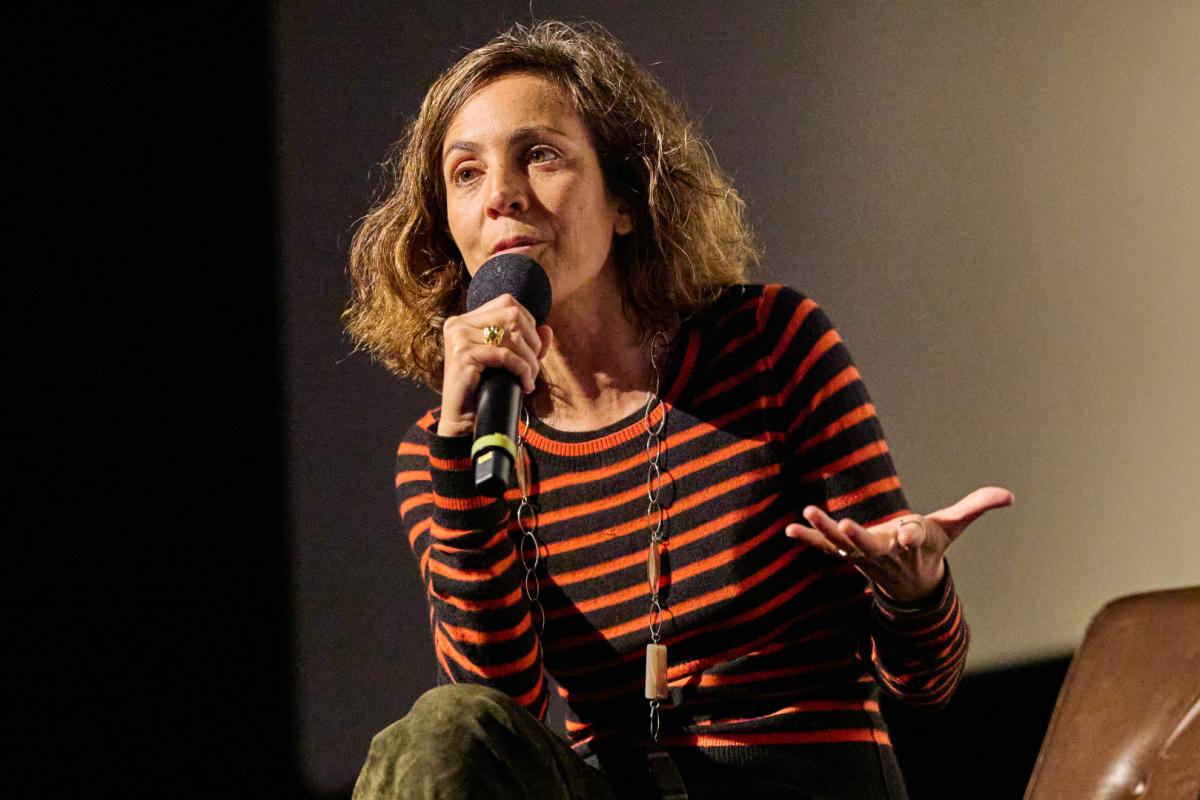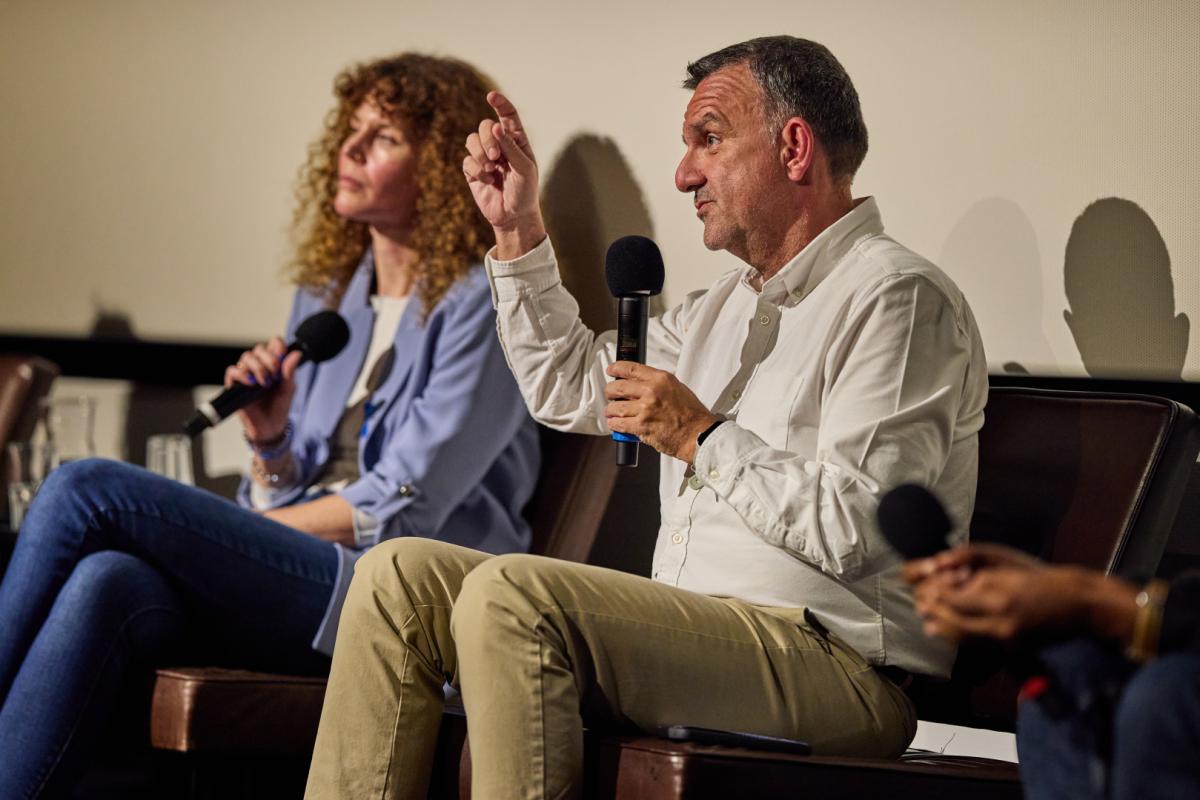As a charity partner of the Zurich Film Festival (ZFF), we had the privilege of hosting a panel discussion on 10 October 2024. The discussion took place immediately after the screening of the documentary “Sudan – Remember Us” by French director Hind Meddeb in the sold-out Frame cinema. Meddeb also participated in the panel discussion, alongside el-Wathig el-Gozoli from the Sudanese Swiss Charity and Petros Mastakas, UNHCR Durable Solutions Officer.
“Sudan – Remember Us” impressively shows how quickly hope can turn into despair. Hind Meddeb was in Khartoum in 2019 and witnessed firsthand the overthrow of long-time dictator Omar Al-Bashir. She followed young activists with her camera, who peacefully advocated for a civilian government through sit-ins, music, poems, and images. But their hope for a new Sudan soon faded when the military violently suppressed the movement… Last year, a war broke out in Sudan. More than 11 million people have already been displaced, making it the world’s largest current humanitarian disaster. All the protagonists in the documentary had to flee abroad.
However, Hind Meddeb does not see this as a defeat, as she stated at the beginning of the panel discussion: “What the Sudanese people created during the revolution is still present.” What she experienced in Khartoum was incredibly inspiring, an explosion of energy. People had an urgent need to express themselves. In fact, she was in Sudan privately, but she started filming people because they wanted her to. When the military finally crushed the revolution, chaos broke out. “I had to find my protagonists again, I didn’t know who was still alive. That was the moment I realised: I have to make a film!” Of course, she hoped the film would end with free elections and not with a war, Hind Meddeb added. But she also had good news: she is still in contact with all the people featured in her film, and they were even all invited to the film festival in Doha.

El-Wathig el-Gozoli is Sudanese and lives in Switzerland. He co-founded the Sudanese Swiss Charity. The group aims to raise awareness among the Swiss population about the situation in Sudan and to collect funds to help the people there. “We donated to UNHCR because we want to be sure that the money really reaches the people who need it,” he asserted. Hind Meddeb’s film made him sad on the one hand. On the other hand, he was very impressed by the spirit of these young Sudanese people. They are not just fighting for themselves, but for future generations. They made it clear: another dictatorship is not an option. El-Wathig el-Gozoli’s father and two sisters fled to Egypt. He still has relatives and friends in Sudan. “The situation is truly terrible. People there can’t trust anyone, no one knows who is actually fighting whom. You can’t even be sure that the police will help you. There is so much crime, violence, women are being raped. Everything terrible we can imagine is happening right now in Sudan.”
Petros Mastakas agreed with el-Wathig el-Gozoli. He has been working for 25 years for displaced populations and was sent to Chad for three months at the end of last year, where he received Sudanese refugees in the border town of Adré. The population of Adré increased tenfold within a few weeks, he recounted. “Imagine: you wake up, and suddenly tens of thousands of people are camping in your streets, schools, squares, and mosques. That’s what the emergency situation looked like there. First, the locals helped the refugees, gave them water, welcomed them into their homes, took them to doctors.” Only then could the international community step up aid, namely UNHCR and other organizations. Water is a scarce commodity in Chad, the population is very poor. Nevertheless, they supported the Sudanese refugees as best they could. “How would that have played out in our society?” Petros Mastakas asked the audience, and many spectators nodded meaningfully. 3 million Sudanese people have now crossed the border, 8 million more have been displaced within their country. They had to leave everything behind, were attacked while fleeing, some were sexually assaulted. And Petros Mastakas addressed the audience again: “Please stand up with me and I will count to 3. You have that long to grab the nearest object or person next to you.” The spectators grabbed their bags, mobile phones, water bottles, and the hands of their loved ones. “That’s what happens to people who have to flee because bombs are suddenly falling. They grab the things right next to them and run.”

At the panel discussion in Zurich’s Frame cinema, it was also mentioned that UNHCR, the UN refugee agency, unfortunately lacks the funds to really help as needed. “Only a quarter of the required budget is secured,” explained Petros Mastakas, UNHCR Durable Solutions Officer, “we urgently need donations.” Without them, it is impossible to help. But it’s not just money that makes a difference. It is just as important to open your heart to the displaced people in Sudan and not to have unfounded fears. “These people are victims of war. They do not bring the war with them; they are fleeing from it.”
The evening ended with many questions from the audience, much applause and hope. Filmmaker Hind Meddeb is convinced: “The Sudanese people are ready to return and rebuild their country. This war cannot last forever.” And el-Wathig el-Gozoli from the Sudanese Swiss Charity agreed: “I am convinced that these committed people will one day achieve what they desire.”
Open your heart to the displaced Sudanese and learn more about this emergency situation.
With a donation, you can support our efforts to help these people; we thank you very much for that.